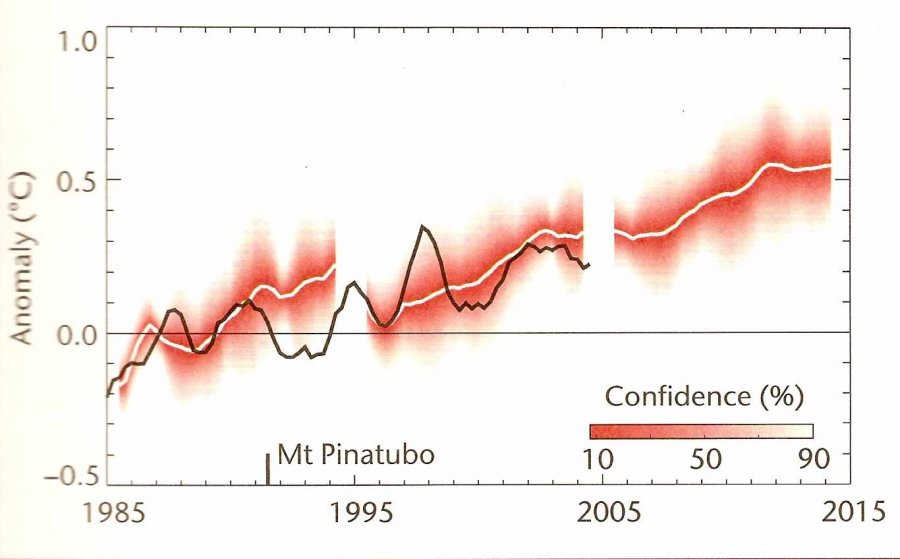NZCLIMATE & ENVIRO TRUTH NO 170
5 MAY 2008
Dr Vincent Gray
FORECASTING THE FUTURE
The IPCC never forecasts the future. My piece "Spinning the Climate" explains that their models are always "projections" NOT forecasts. Their models are "evaluated" not validated. Their statements as to what is "likely" , even if "90% likely" are no more than an opinion, a guess, not scientific evidence.
All of the IPCC Reports make "projections" of what is "likely" in the year 2100. These are always carefully arranged so that nobody alive today is "likely" to be around in order to check whether the "projections" will actually happen.
This, of course, does not prevent journalists, economists, politicians, and former US Presidential candidates, claim that these "likelihoods" are not only "unequivocal" but also absolute certainties; but nobody so far has had the courage to make a "prediction" for even fifty years ahead, let alone ten years ahead, or, beshrew the thought, next year.
All this is beginning to change. The trouble is, we have had a period of ten years without any warming at all, completely contrary to the "projections", and even the "predictions". The IPCC people have reacted to this by actually predicting future temperatures much more closely.
I first came across it when I was at the Bali Climate Change Conference recently. I met, at the UK Met Office Stand, one of the "Lead Authors" of the IPCC Science Report, Richard Betts. He had a new pamphlet for the Met Office which gave a prediction of the global temperature (Attached) which gives a 90% certainty that global temperatures are going up in 2010. I offerred to bet him $100 he was wrong, but he would not bite, even when I told him would be 88 by then.
The following papers in the 1 May copy of "Nature" seems to disagree. Now they are actually predicting even more cooling, but, of course, it is bound to go up eventually.
Richard Wood 1
Nature 453, 43-45 (1 May 2008) | doi:10.1038/453043a; Published online 30 April 2008
Abstract
The effects of global warming over the coming decades will be modified by shorter-term climate variability. Finding ways to incorporate these variations will give us a better grip on what kind of climate change to expect.
Climate change is often viewed as a phenomenon that will develop in the coming century. But its effects are already being seen, and the Intergovernmental Panel on Climate Change recently projected that, even in the next 20 years, the global climate will warm by around 0.
1. Richard Wood is at the Met Office Hadley Centre, FitzRoy Road, Exeter, Devon EX1 3PB, UK.
Email: [email protected]
and then
Advancing decadal-scale climate prediction in the North Atlantic sector
N. S. Keenlyside1, M. Latif1, J. Jungclaus2, L. Kornblueh2 & E. Roeckner2
1. Leibniz Institute of Marine Sciences, Düsternbrooker Weg 20, D-24105 Kiel, Germany
2. Max Planck Institute for Meteorology, Bundesstras zlige 53, 20146 Hamburg, Germany
Nature 453, 84-88 (1 May 2008) | doi:10.1038/nature06921; Received 25th June 2007; Accepted 14 March 2008
Abstract
The climate of the North Atlantic region exhibits fluctuations on decadal timescales that have large societal consequences. Prominent examples include hurricane activity in the Atlantic 1, and surface-temperature and rainfall variations over North America 2, Europe3 and northern Africa4. Although these multidecadal variations are potentially predictable if the current state of the ocean is known 5, 6, 7, the lack of subsurface ocean observations8 that constrain this state has been a limiting factor for realizing the full skill potential of such predictions9. Here we apply a simple approach—that uses only sea surface temperature (SST) observations—to partly overcome this difficulty and perform retrospective decadal predictions with a climate model. Skill is improved significantly relative to predictions made with incomplete knowledge of the ocean state10, particularly in the North Atlantic and tropical Pacific oceans. Thus these results point towards the possibility of routine decadal climate predictions. Using this method, and by considering both internal natural climate variations and projected future anthropogenic forcing, we make the following forecast: over the next decade, the current Atlantic meridional overturning circulation will weaken to its long-term mean; moreover, North Atlantic SST and European and North American surface temperatures will cool slightly, whereas tropical Pacific SST will remain almost unchanged. Our results suggest that global surface temperature may not increase over the next decade, as natural climate variations in the North Atlantic and tropical Pacific temporarily offset the projected anthropogenic warming.
When asked, recently.they replied
"The IPCC would predict a 0.3°C warming over the next decade. Our prediction is that there will be no warming until 2015 but it will pick up after that."
Also see
http://www.telegraph.co.uk/earth/main.jhtml?xml=/earth/2008/04/30/eaclimate130.xml
One of our New Zealand IPCC Lead Authors, Jim Renwick, recently produced the attached future forecast for New Zealand, which seems to disgree with the "consensus". for the "globe".
You may note that there has been no warming in New Zealand for fifty years, and, that, according to Jim, it's going to go up straightaway. Are there any betting enthusiasts amongst you?
